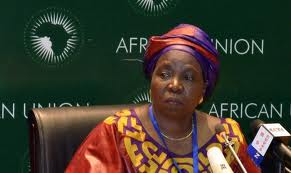African Union Zuma’s gives opposition groups five days to sign Sudan roadmap
March 24, 2016 (KHARTOUM) – The head of the African Union Commission Nkosazana Dlamini Zuma, welcomed the signing of the Roadmap Agreement by the Sudanese government and urged the opposition groups to sign it within five days.

In line with the 21 March agreement, the government accepted for the first time to negotiate with the SPLM-N without demanding to disarm its fighters before the full implementation of a future political agreement as it had being demanding since the start of the conflict in June 2011.
However, the opposition groups, Justice and Equality Movement, National Umma Party (NUP), Sudan People’s Liberation Movement -North (SPLM-N), and Sudan Liberation Movement-Minni Minnawi (SLM-MM) refused the roadmap saying it would lead to reproduce the regime.
“The Chairperson of the Commission commends the Government of Sudan for signing the Roadmap Agreement, as part of efforts aimed at addressing the numerous challenges facing Sudan,” said a statement released on Wednesday evening.
Zuma further called on the four opposition groups ” to urgently sign the Agreement, and latest by 28 March, in order to give impetus to a process that shall lead to the settlement of Sudan’s multiple conflicts”.
Also, she called on the opposition to ”desist from making any unhelpful public statements” so as to avoid jeopardizing ongoing efforts to achieve peace in Sudan.
The African Union official didn’t explain what she intends to do if the opposition groups maintain their rejection of the roadmap. But SPLM-N Secretary General Yasir Arman said they were warned that the AU Peace and Security Council and the UN Security Council could take some measures against them.
The opposition groups said that this roadmap not only disagrees with the previous roadmap endorsed by the African Union Peace and Security Council but it legitimizes the ongoing dialogue process which is entirely controlled by the ruling National Congress Party.
However, AUHIP chief, Thabo Mbeki, insisted on the need to stop war and to open humanitarian assistance to the civilians in the war affected areas.
Regarding the national dialogue, Mbeki said all the difference between the opposition and the government is on the venue of the talks, pointing that the dialogue committee admitted that the process was not inclusive.
On a related development, Zuma welcomed a meeting held in Khartoum under the auspice of the AUHIP between the dialogue coordination committee et the opposition coalition of the Future Forces for Change (FFC), on 22 March.
“This meeting presented an important opportunity for improving the working relationship between the 7+7 National Dialogue Steering Committee and the opposition parties based in Sudan,” said the statement.
The dialogue committee and the FFC agreed to establish a four-member committee from the two sides to develop and agenda for the discussions between the two sides on ways to hold an inclusive dialogue.
FFC forces include several splinter factions from the ruling party who were involved in the dialogue process but distanced themselves after the government refusal to implement confidence building measures aimed at creating a suitable atmosphere for an inclusive dialogue.
(ST)
